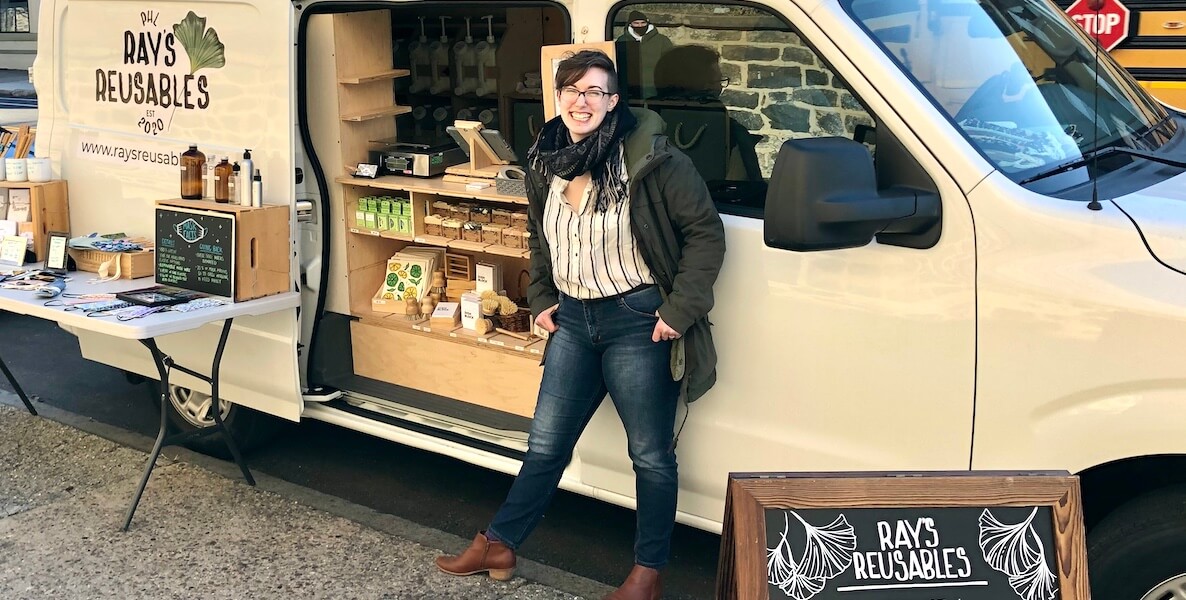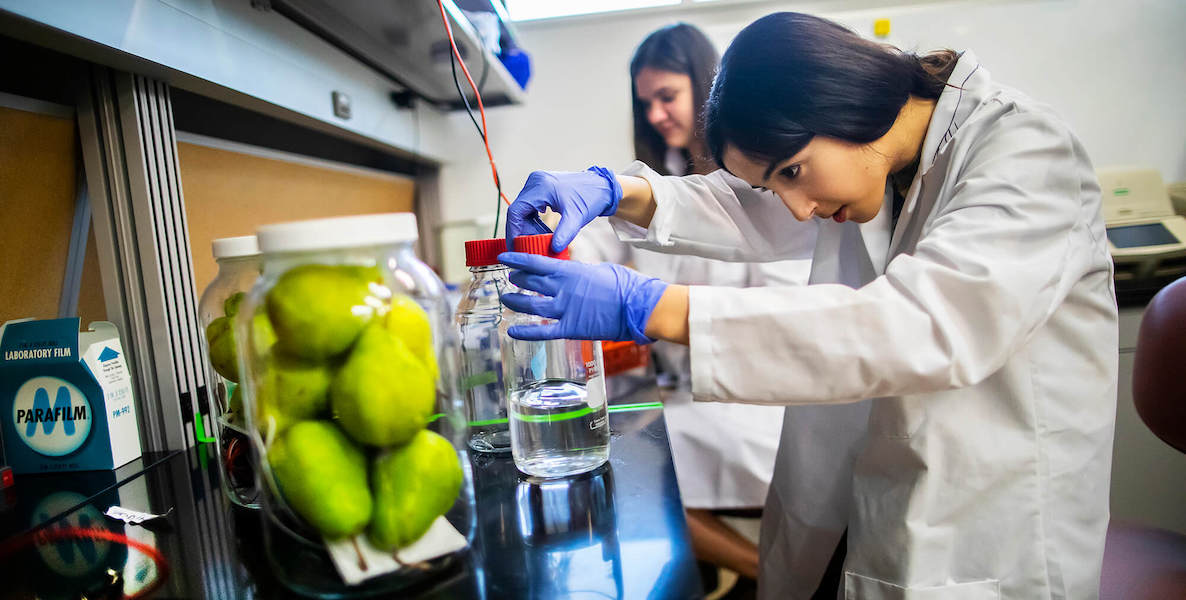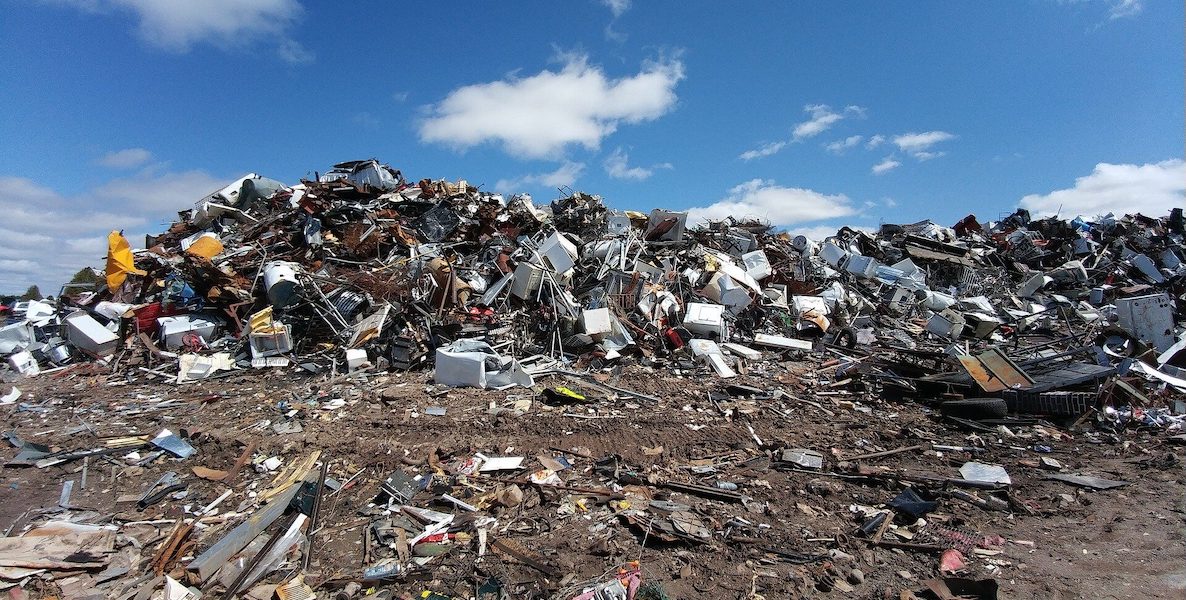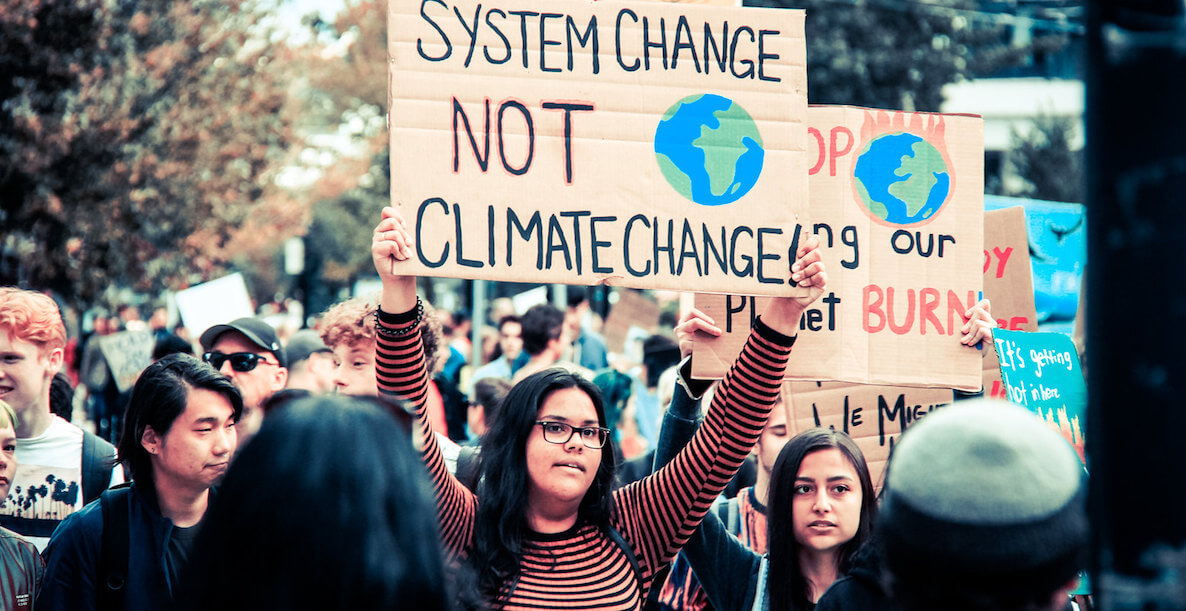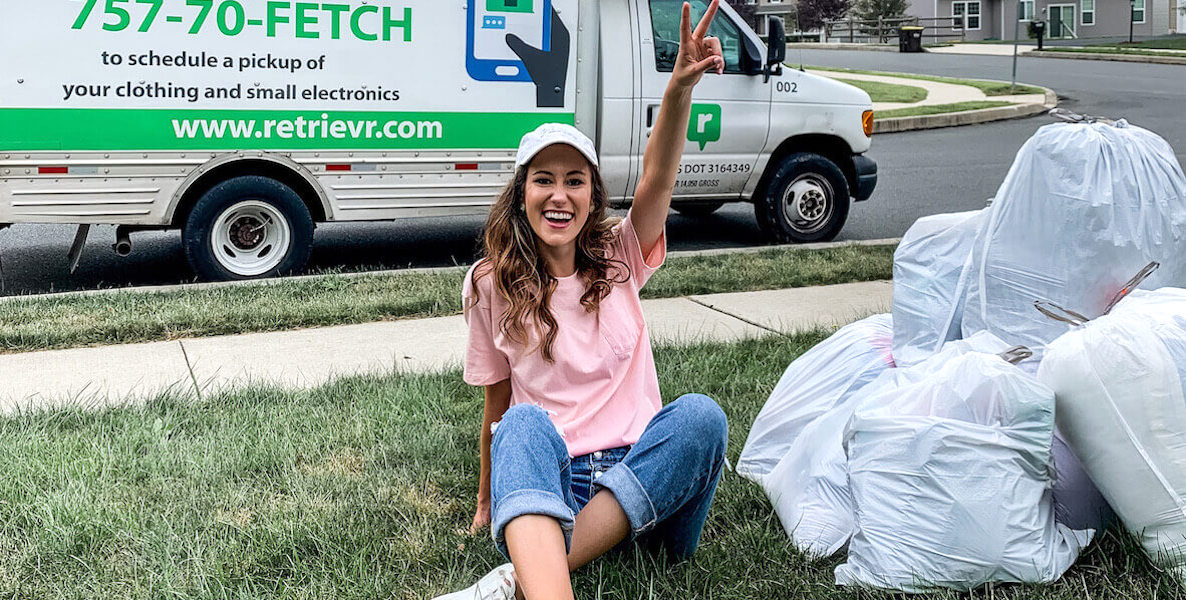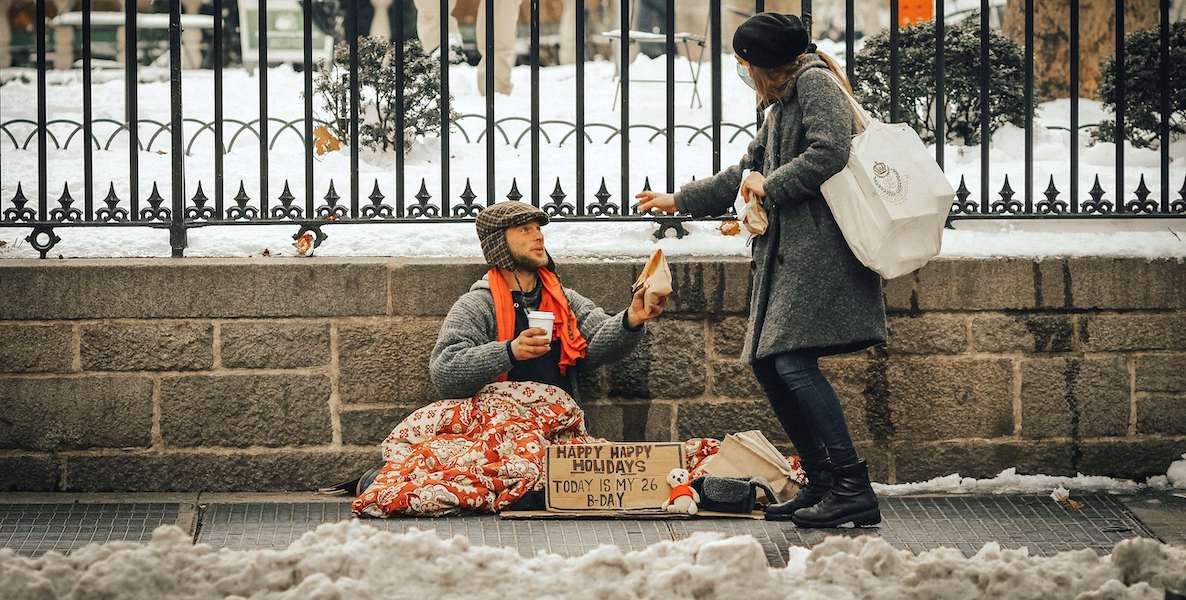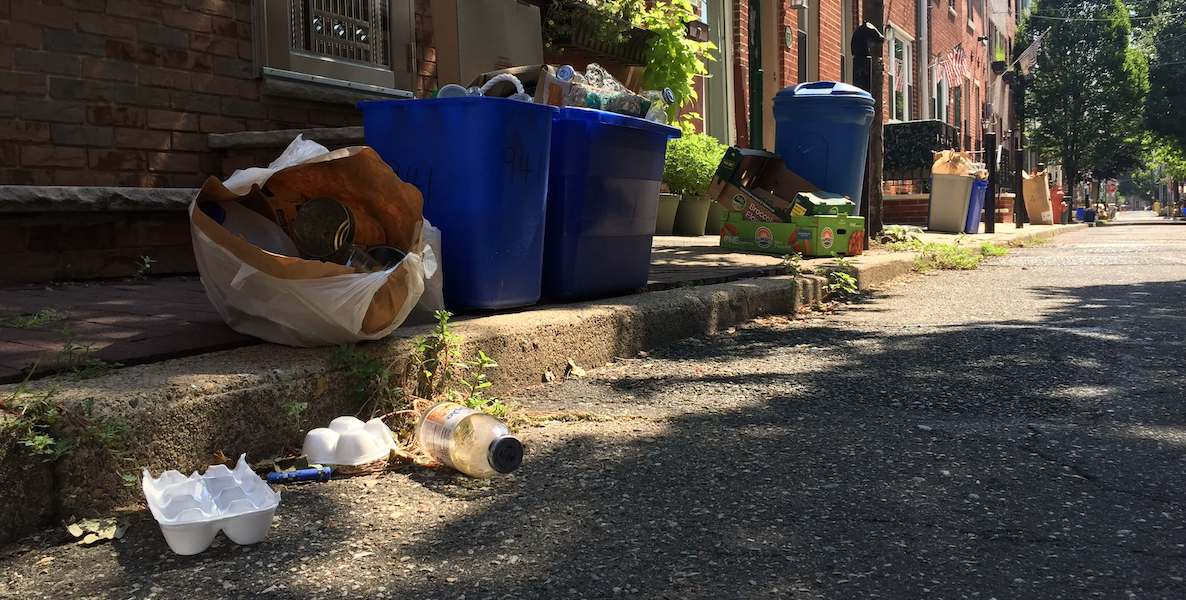John C. Sawhill, the late former president and CEO of The Nature Conservancy, once said “A society is defined not only by what it creates, but by what it refuses to destroy.”
In that spirit, Sawhill — who also served, among other roles, as Deputy Secretary of Energy and as president of NYU — might have been heartened by a new collaboration in Philly.
Last year, the City’s Office of Technology and Innovation (OIT) — specifically, its two-year-old SmartCityPHL Initiative and the Pitch & Pilot program it oversees — selected Retrievr, a company that facilitates residential recycling, to make a dent in two of the least-often recycled sources of waste: electronics and clothing, which together make up just over 8 percent of household waste in Philadelphia.
Philadelphia residents throw more than 35,000 tons of clothing and other textiles in the trash each year. (Math shortcut: 1 ton is 2,000 pounds.) Nationally, meanwhile, while electronic waste makes up just two percent of trash in landfills, it equates to 70 percent of toxic waste.
![]() Retrievr, a New York-based startup, addresses this staggering problem by co-opting the model cities use for recycling: picking up the waste directly from people’s homes, for a fee, through a phone-based app in more than 80 participating municipalities in the Philly region. (During Covid-19, all pickups are contactless.)
Retrievr, a New York-based startup, addresses this staggering problem by co-opting the model cities use for recycling: picking up the waste directly from people’s homes, for a fee, through a phone-based app in more than 80 participating municipalities in the Philly region. (During Covid-19, all pickups are contactless.)
Retrievr then sends the items it collects “downstream” to companies that are vetted by one of two certifying organizations to make sure they do right by the environment and their employees, and uphold a certain level of data security. Appliances like air conditioning units have their freon removed and then, like microwaves, are disassembled into their component parts — plastic, metal, glass — for further recycling.
Clothing goes to any number of recipients: Retrievr sells to bulk buyers who determine whether clothing will be resold, or downcycled into uses like furniture stuffing, and so on.
Since launching here last summer, Retrievr has diverted 71,991 pounds of clothing and 34,260 pounds of electronics, for a total of 106,251 pounds of waste, from Philly’s landfills. And Pitch & Pilot fellow Joanna Hecht has been particularly encouraged to see that people are using the service in all parts of the city.
“What was appealing about Retrievr’s proposal was the immediate impact it could have, the simple convenience, and the low cost to the city,” says Hecht. The city provided Retrievr with $12,000, and for the duration of its three-month pilot last summer, home pickups were free (with the exception of particularly heavy items, like televisions over 150 pounds).
A call for solutions
Retrievr was one of two dozen companies and organizations from around the world that participated in the City’s first Pitch & Pilot program, calling for solutions to reduce waste and increase waste diversion to help Philly achieve its “Zero-Waste” goal to fully eliminate the use of landfills and conventional incinerators by 2035.
Hecht and a team of judges made up of colleagues from the Streets Department, Parks and Rec, city government agencies, the private sector, universities, and nonprofits selected two winners, including Retrievr. The other, Metabolic, predicts the amount of waste from demolished buildings that could be reused in new construction, and identifies where construction demand exists to use those materials.
“What was appealing about Retrievr’s proposal was the immediate impact it could have, the simple convenience, and the low cost to the city,” says Hecht.
“The overall approach of Pitch & Pilot is to identify some meaty challenges that the city is facing and ask for solutions from the private sector,” says Hecht.
The Pitch & Pilot program is the latest iteration of Philly’s Smart City initiatives, an idea which refers to using technology to make life better for citizens, while making governments more efficient and transparent. Philly has had a somewhat rocky relationship with technology, moving at a one-step-forward-two-steps-back kind of pace for the last several years.
This latest effort is one piece of the Smart City Roadmap, which OIT released last year after a two-year, $200,000 effort—funded by the Knight Foundation — to create a set of principles that would guide the City as it decides what problems to solve and who will solve them: Locally-inspired (so, specific to Philly); innovative; equitable for all Philadelphians; and collaborative among city departments, the private sector and communities.
“One of the key components to being a successful smart city is recognizing that there’s a role that the City can play, and there’s a role that the private sector or academia can play,” says Emily Yates, Smart City Director at the Office of Innovation and Technology. “I think there’s a lot of criticism of smart cities that they’re just shiny technology, the next new [trend]. But I want Smart City PHL to be known as a program that’s working to look at equity and inclusion and address some of these inherent challenges that cities are facing.”
That led, last January, to this first “call for solutions” to tackle an issue that affects every Philadelphian: trash and waste, something that became even more urgent when the pandemic hit. “We selected Retrievr a month prior to Covid happening,” Yates says. “But by the time we deployed them, everybody was home clearing out their closets and cleaning out their homes.”
While the pilot with Retrievr wrapped up in September, the company continues to offer its services in Philadelphia with a fee for pickups, ranging from $10 for microwaves to $50 for air conditioning units to $100 for television sets over 150 pounds. From December through mid-February, Retrievr waived fees for computers, as part of the city’s PHLDonateTech program (more on that, later).
Minding the loop
Retrievr was launched in 2018 by Ron Gonen, the founder of Closed Loop Partners, an investment firm focused on companies that are building the circular economy—that notion of moving beyond our linear, consumptive, wasteful economy into a circular one, in which materials are reused and repurposed, not just thrown away.
Gonen recognized that the recycling rate for clothing and electronics are both historically, stubbornly low. So he looked at how progress had been made with paper, bottles, and cans — and recognized the importance of going directly to people’s homes.
![]() Gonen tapped Kabira Stokes, a veteran of the business-to-business recycling industry, to become Retrievr’s CEO in May. And while Retrievr has corporate headquarters in New York, where it was founded, Stokes, as well as the company’s vice president, three drivers and the support administrator all live in the Philly area; as the company’s Souderton, PA, operation grows, so too will the local workforce.
Gonen tapped Kabira Stokes, a veteran of the business-to-business recycling industry, to become Retrievr’s CEO in May. And while Retrievr has corporate headquarters in New York, where it was founded, Stokes, as well as the company’s vice president, three drivers and the support administrator all live in the Philly area; as the company’s Souderton, PA, operation grows, so too will the local workforce.
Retrievr has not yet turned a profit, but Stokes anticipates doing so shortly—in part thanks to the company’s newest initiative, launching this week: a clothing buy-back program. Retrievr now has a list of dozens of clothing brands, from Adidas to Levi’s, and items that they’ll actually pay money, from $5 to $40, to collect from customers.
Philadelphia residents throw more than 35,000 tons of clothing and other textiles in the trash each year. Nationally, meanwhile, while electronic waste makes up just two percent of trash in landfills, it equates to 70 percent of toxic waste.
Those payments are a percentage of what Retrievr estimates they’ll be able to make through re-sale. So, for example, if you have a pair of jeans sitting in your closet but haven’t been motivated to go through the process of re-sale, Retrievr will take them off of your hands and do the work of re-sale for you. Yes, Retrievr stands to make more money than they’ll pay you — but they’ve done the harder work, taken on the hassle, to earn it.
As they grow their services, the company is also planning expansion into new markets; they’re currently in talks with three new cities.
Stokes says that having a fee-for-services model, versus charging cities for services, has been key to getting buy-in from local governments. “We knew going into this that asking municipalities to pay us money to do this was going to be a nonstarter,” she says. “We know that budgets are strapped, and obviously in Covid times, so much more so.” In New York City, for example, electronics recycling has been put on hold.
And more than money, what Retrievr needs from cities is their mouthpiece. “People call sanitation departments all the time and say I don’t know what to do with my fill-in-the-blank. So what we need from cities is for them to say, Well, this is a service you can use that we believe in,” says Stokes.
In return, when Retrievr hits a certain amount of participation, they do a revenue share back to cities. Philly recently earned back $1,500, which they applied to waiving pickup fees for computers as part of PHLDonateTech, the city’s effort to get computers into homes of families who need them.
“Based on the 2018 American Community Survey, it is estimated that 12 percent of Philadelphia households lacked even one device, but with everyone now home trying to work and do remote schooling, families continue to struggle to do their telehealth visits, sign up for the coronavirus vaccine, find work, enroll in workforce classes, and pay their bills without a basic device where they can easily fill out a government form,” Yates says. (Comcast has taken the lead in Philly on getting Chromebooks to students, but there are still households that have been left out.)
So Retrievr offered free pickup of computers, sending them to a company called NerdIt Now to be refurbished and then supplied to local families. From December to mid-February alone, Retrievr collected 498 computers in Philly, which are already being placed in the homes of local residents.
Has Retrievr eliminated our clothing and electronics waste? Of course not. In fact, the model—charging already highly-taxed, often financially-stressed residents to haul away their waste—leaves a significant portion of the population out all together. It’s hard to imagine wide-scale adoption of a program that requires people living in high poverty neighborhoods to lay out more money to recycle their textiles.
![]() But it’s not unprecedented: In lieu of a citywide composting program, for example, companies like Bennett Compost have adopted a similar model. For a low monthly fee, Bennett gives customers a bucket for food waste, picks it up from outside their house once a week, turns it into compost and sells the product to growers. That business, too, has a limited customer base—but it continues to grow, and to employ local staff at living wages. And, if and when the City decides to offer curbside pickup for food waste, it has a model it can follow.
But it’s not unprecedented: In lieu of a citywide composting program, for example, companies like Bennett Compost have adopted a similar model. For a low monthly fee, Bennett gives customers a bucket for food waste, picks it up from outside their house once a week, turns it into compost and sells the product to growers. That business, too, has a limited customer base—but it continues to grow, and to employ local staff at living wages. And, if and when the City decides to offer curbside pickup for food waste, it has a model it can follow.
Similarly, Retrievr has plans to grow its service in Philadelphia, by amplifying its advertising and outreach this spring.
And as Retrievr looks to the future, so too do Yates and Hecht. In the coming weeks, Smart City PHL will be announcing its next Pitch & Pilot opportunity—this one focused on addressing food insecurity, and the logistics around food distribution.
“The goal is to look at how can we leverage the city’s procurement power to help address food insecurity as well as some of the economic challenges the city’s facing in the food industry,” Yates explains. “The system that we’ve created is great because it hits all of the pieces that, as a smart city, we want to support: small businesses, tapping into locally developed workforce, and getting tech into the hands of people who need it.”

How to recycle electronics and clothing in Philly with Retrievr
Recycling electronics and clothing is now easier than ever with the Retrievr service. You can either go to their website to schedule a pick up, or do it all from your phone. Here’s how:
- Text “Pickup” to 757-703-3824, and wait for a response
- Provide your address to make sure you’re in their coverage area
- Provide a brief rundown of what you have to be recycled (here’s a list of what’s accepted)
- Schedule a convenient time for the contactless pickup
- Bag or box up your items and leave them on your stoop
- Retrievr will pick it up on the day and time scheduled
- Voila!



